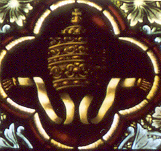
Return to
Index The Catholic Faith
Return
to Level One Topic Index
Home Page
The Church is holy and divine because it was founded by Jesus, who is God. But the Church is also human. Its members are redeemed by Christ and are striving for holiness, but they are not perfect. Even the early Christians were not able to work together in perfect agreement. For instance, the Greek Christians complained that their widows were getting less of the money collected for the poor than widows of the Hebrew Christians. Another problem came up when pagans who became Christians refused to follow certain laws of the Jewish religion. They did not think that these laws had anything to do with belief in Jesus. The Jewish Christians, on the other hand, thought just the opposite. After all, Jesus had not given permission for these laws to be changed. Still more difficulties arose when the Temple leaders began persecuting the Christians. Someone had to decide where and how Christ's followers should meet in secret for worship and instruction.

Fortunately, Jesus had given the apostles not only the mission to preach the gospel but to the power to govern the Church as well. Peter and the apostles had the power to make decisions about running the Church in everyday matters. They could also make laws that would help Church members to live the Christian life more easily. These decisions and laws were not truths about God that could never be changed. But Christians were bound to accept these decisions because the apostles had the special authority given them by Jesus, who promised them the guidance of the Holy Spirit. Remember the words of Jesus to Saint Peter. "What you bind on earth will be bound in Heaven; what you loose on earth will be loosed in Heaven" (Mt 16:19).
The apostles were the very first bishops. As today, the bishop had the power to teach the message of Jesus, to govern the Christians under his care and to administer the sacraments. Each bishop was in charge of Christians in a certain part of the world. The Church grew, however, and the apostles knew they could not be everywhere at once. They also knew that they would not be with the Church on earth for ever. Since more than twelve bishops were needed, the apostles passed on their powers to other men. Through the years, these powers have been passed down, right to this very day. Today the bishop in charge of the diocese where you live has these same powers to rule, teach, and sanctify.
Even though there are many bishops, there are not enough to take care of every spiritual need of every Christian. That is why bishops have helpers called priests. Bishops share with priests their powers to celebrate the Eucharist and some of the other sacraments. Priests also help the bishop to govern, by taking care of smaller groups of Catholics, which we know as parishes. The priest is also allowed to represent his bishop's teaching authority by preaching at Mass.
Priests also have helpers who are called deacons. Like the priest, the deacon is ordained by a bishop, but he does not have the power to celebrate the Eucharist. The deacon can administer the sacrament of Baptism; he can witness marriages. The deacon may proclaim the Gospel and preach at Mass and distribute Holy Communion. He can also conduct funeral services. The deacon helps the priest by visiting the sick and by using his talents in different ways for the good of the parish.
Saint peter was the first bishop of Rome. He was also the first Pope. The Pope has the power to govern and teach the entire Church. Whenever a Pope dies, a new one is elected from a special group of Church leaders called Cardinals. The Pope, often with the help of the bishops, makes laws that govern the entire Church. One example of Church laws that govern Catholics the world over are the "Precepts of the Church". By these precepts every Catholic must:
1. Assist at Mass on all
Sundays and Holy Days of Obligation.
2. Fast and abstain on the days appointed.
3. Confess his sins at least once a year. (Annual confession is obligatory
only if serious sin is involved.)
4. Receive Holy Communion during the Easter time.
5. Contribute to the support of the Church.
6. Observe the laws of the Church concerning marriage.
Because Christ gave it the mission to govern his followers, the Church can change according to the needs of God's children. Over the years, some Church laws about fasting, the liturgy, and the sacraments have changed. But the Church also tells us what things cannot be changed: those things which God has revealed as true.
Used with the permission of The Ignatius Press 800-799-5534
Return to Index The Catholic Faith
Return
to Level One Topic Index
Top
Home Page